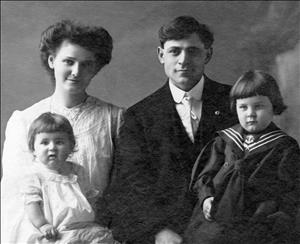Dorothea (Pfister) Nordstrand (1916-2011) wrote this reminiscence about a mother's courage and industrious good cheer during hard times. The mother was Mary Annie (Gierhofer) Pfister (1888-1962). In 2009 Dorothea Nordstrand was awarded AKCHO's (Association of King County Historical Organizations) Willard Jue Memorial Award for a Volunteer, in part for contributing these vivid reminiscences to HistoryLink.org's People's History library.
A Matter of Pride
When Daddy was badly injured in a streetcar accident in 1920, our family, newly arrived from a homestead in Eastern Washington, was plunged deep into poverty.
Mom had more than her fair share of pride and she refused to accept charity, even when we were reduced to eating only what she could find in our skimpy, depleted garden and what we could bring home from our once-weekly visit to the Pike Place Market. She always took me with her. I was small for my age and she was never asked to pay the nickel fare for me, reserving that nickel to pay for a nice head of cabbage at the market. Her streetcar tokens at that time were two-for-a-quarter. For a less than a dollar, we brought home vegetables we couldn’t grow at home, or had run out of. And, always a few cabbages to add to our sauerkraut barrel.
Meat was another matter.
Mom was used to bartering. On our homestead near Tiger, she had bartered her home-made butter for what she needed at the general store.
In the Green Lake district, a few short blocks from our house, was a lovely, big meat market owned and run by Charley Rayner, a big, husky man with a heart to match. I’m sure he would have given Mom what she asked for, which was the neck bones from the pork carcasses he butchered, but she asked what job of cleaning he hated most about the shop and she would do that in trade for the bones.
They struck a deal. Mom would go in early every morning and clean the glass showcases so they would be sparkling when Mr. Rayner stocked them with the day’s offerings.
Occasionally, there would be something extra in the package of meaty bones he saved for her ... a few chops or a small piece of beef. Each time that happened, Mr. Rayner would arrive the next morning to sparkling glass meat cases and a freshly swept butcher shop, including the stoop and two steps to the sidewalk.
Mr. Rayner told me this story years later when I worked as a teller at the neighborhood bank. I remember him telling me, “Your mother is a fine, proud woman. I would like to have done more for your family, but was sure that if I did she would take over my work at the store!” and he would laugh his big, booming laugh and I would smile my agreement with his conclusion about Mom’s pride ... my heart full of my pride in her.

